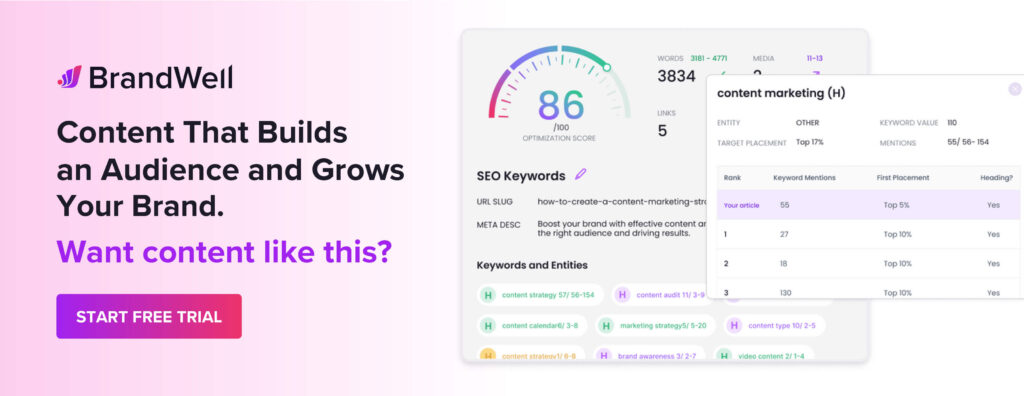Discover top guides, trends, tips and expertise from AIO Writers
Is There a Future for Blogging in the Age of Video & Social Media?
Jeff Joyce
Monday, 10th Feb 2025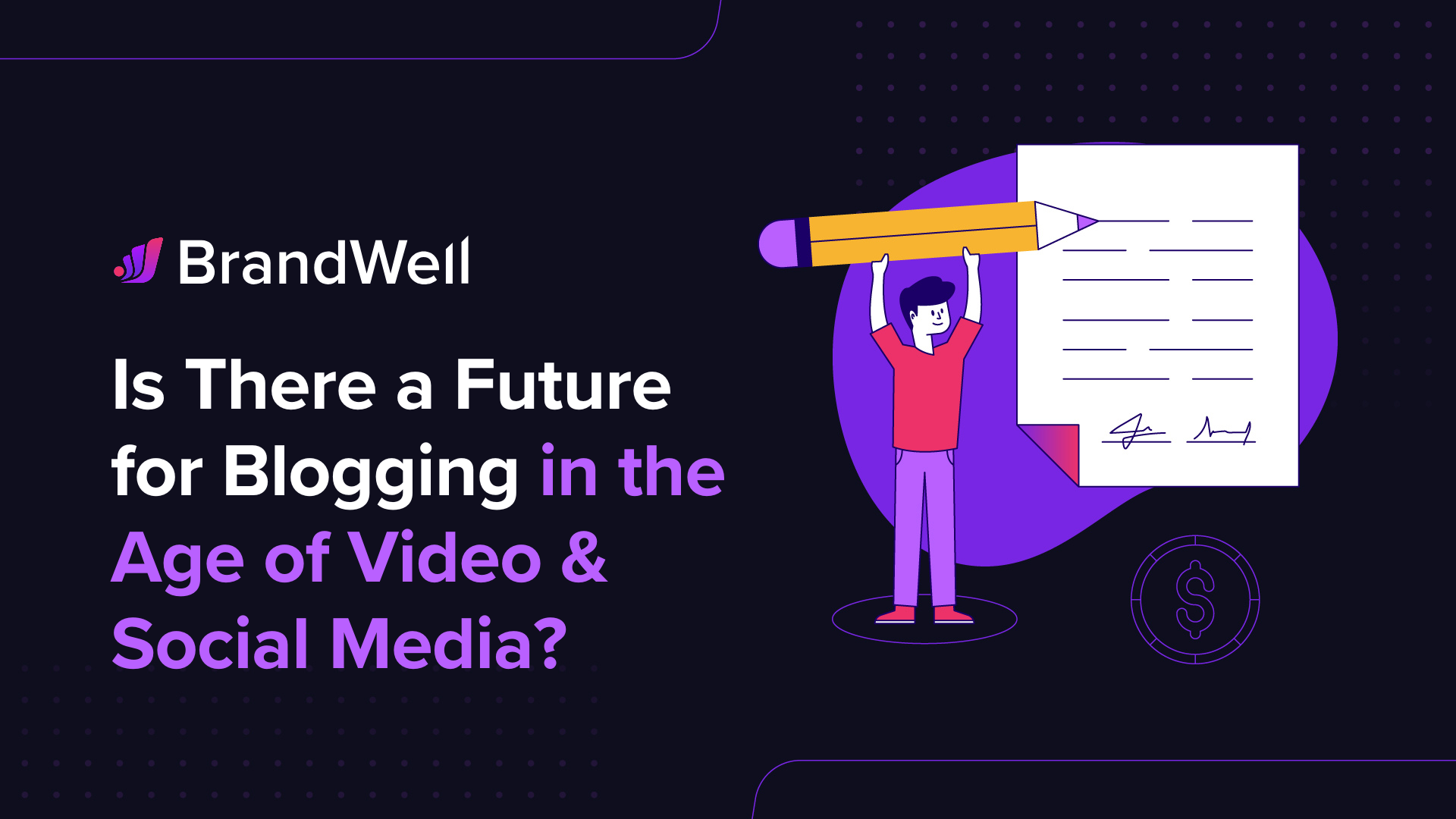
The rise of short-form video platforms like TikTok, Instagram Reels, and YouTube Shorts has changed the way people consume content.
Attention spans are shrinking, and algorithms prioritize visual engagement over long-form text.
So, does blogging still have a place in the digital landscape?
The short answer: Yes — but it’s evolving.
Blogging is no longer just about writing. It’s about creating an engaging, multimedia experience that integrates video, social media, and interactive content. Successful bloggers adapt, experiment, and innovate while staying true to their core message.
In this post, we’ll explore how bloggers can stay relevant, build authority, and monetize effectively in 2025 and beyond.
Table Of Contents:
- The Current State of Blogging
- Will AI Replace Human Bloggers?
- How to Adapt to the Changing Blogging Landscape
- Finding Your Niche in the Crowded Blogging Space
- Monetizing Your Blog in 2025 and Beyond
- The Importance of Quality Content and User Experience
- The Future of Blogging: Trends and Predictions
- FAQs: Is There a Future for Blogging?
- Conclusion
The Current State of Blogging
Blogging has come a long way since the early days of online diaries. What started as a simple way to share thoughts and experiences has evolved into a powerful tool for businesses, entrepreneurs, and individuals alike.
But with so many changes in the blogging landscape over the years, it’s natural to wonder where the state of blogging is headed.
How Blogging Has Evolved Over the Years
When I first started blogging, it was all about sharing personal stories and connecting with like-minded individuals. But as time went on, I noticed a shift in the way people approached blogging.
Businesses began to recognize the potential of blogging as a marketing tool, using it to attract and engage potential customers. Individuals started monetizing their blogs through advertising, sponsorships, and affiliate marketing.
The Rise of Video Content
One of the biggest changes I’ve seen in the blogging world is the rise of video content. With the popularity of platforms like YouTube and TikTok, many bloggers are incorporating video into their content strategy.


The Impact of Social Media
Social media has also had a significant impact on the blogging landscape. Platforms like Facebook, Twitter, and Instagram have made it easier than ever for bloggers to promote their content and connect with their audience.
But with so much noise on social media, it can be challenging to stand out. That’s why it’s more important than ever to create high-quality, valuable content that resonates with your target audience.
Will AI Replace Human Bloggers?
As artificial intelligence (AI) continues to advance, many bloggers are wondering if their jobs are at risk.
Will AI-powered tools like GPT-3 eventually replace human writers?
The Capabilities and Limitations of AI in Content Creation
There’s no denying that AI has come a long way in recent years. AI writers can now generate human-like text on a wide range of topics, from news articles to creative writing.
But while AI can certainly assist with content creation, it still has its limitations. AI-generated content often lacks the nuance, creativity, and personal touch that human writers bring to the table.
Rather than replacing human bloggers, I believe AI will become an increasingly valuable tool for content creation.
AI-powered tools can help with tasks like keyword research, topic ideation, and even drafting blog outlines. But at the end of the day, it’s up to human writers to take those AI-generated ideas and turn them into compelling, engaging content that resonates with their audience.


One thing that AI can’t replicate is the unique perspective and creativity that human writers bring to their work. As a blogger, your personal experiences, opinions, and insights are what set you apart from the competition.
By infusing your AI content with your voice and personality, you can build a loyal following of readers who trust and value your expertise. And that’s something that no AI tool can replace.
How to Adapt to the Changing Blogging Landscape
As the blogging landscape continues to evolve, bloggers need to adapt and stay ahead of the curve.
Here are a few strategies I’ve found effective for staying relevant in the era of AI.
1. Incorporate Video Content into Your Blogging Strategy
Let’s be real — video is taking over the internet.
While blog posts are still valuable, video grabs attention faster, keeps people engaged longer, and is heavily favored by social media algorithms.
If you’re still relying only on text, you’re missing out on a huge opportunity to expand your reach, boost engagement, and future-proof your blog.
Why should you add video content to your blogging strategy?
✔️ People Prefer Watching Over Reading
With shrinking attention spans and an overwhelming amount of content online, video makes information easier and quicker to consume.
- A 2-minute video can summarize an entire 2,000-word blog post.
- Readers who might skim through a post are more likely to watch a short video instead.
- Video adds a personal touch — people connect with faces, voices, and expressions in a way that text alone can’t match.
Let’s say you’re writing a blog post about “10 SEO Tips for 2025.” Instead of just listing them, create a quick video rundown of those tips and embed it at the top of your post. Readers who don’t have time to read the whole article can watch the highlights in seconds.
✔️ Video Boosts Engagement & SEO
Google loves video content. Pages with embedded videos tend to:
- Rank higher in search results.
- Keep visitors on the page longer (which improves your SEO metrics).
- Get shared more on social media.
Say you publish a blog post on “How to Start a Blog in 2025.” If you include a step-by-step tutorial video in your post, visitors are more likely to stay on your page and interact with the content, signaling to Google that your post is what visitors are looking for.
✔️ Social Media Platforms Prioritize Video
If you want free organic reach, video is your best bet.
Social media algorithms favor video content over plain static text or image posts, including platforms like:
- Instagram (Reels > everything else)
- Facebook (Video posts get 59% more engagement than other post types)
- LinkedIn (Native videos get 5x more engagement)
- TikTok & YouTube Shorts (Fastest-growing platforms for discoverability)
If you’re only sharing blog post links on social media, you’re not reaching as many people as you could. But if you create short, engaging videos based on your blog posts, you can drive traffic back to your blog effortlessly.
If you have a blog post about “The Best AI Writing Tools for 2025,” you can turn it into:
- A TikTok/YouTube Short showing quick reviews of the top tools.
- A carousel on Instagram with key takeaways.
- A LinkedIn post with a video breakdown of why AI tools are the future of content creation.
Now, instead of just hoping people click your blog link, you’re giving them valuable content first and increasing the chances they’ll visit your site.
How to Add Video to Your Blog Without Overcomplicating Things
You don’t need fancy equipment or professional editing skills to start using video. Here’s how you can effortlessly add video content to your blog:
1. Record Quick Video Summaries of Your Blog Posts
- Use your phone or webcam to record a 1-2 minute summary of your latest blog post.
- Upload it to YouTube, TikTok, or Instagram Reels and embed it at the top of your blog post.
Even if visitors don’t read the full post, they’ll still get the key takeaways.
📌 Pro Tip: If you don’t want to be on camera, use tools like Synthesia or Pictory to create AI-generated videos.


2. Create Step-by-Step Tutorials & Explainer Videos
If your blog covers how-to content, tutorial videos are a goldmine.
- Screen recording software (Loom, OBS Studio, Camtasia) lets you walk readers through a process. For example: If you’re writing a blog about “How to Build a Website,” record your screen showing how to do it.
- Upload the video to YouTube and embed it into your blog post for extra engagement.
📌 Pro Tip: YouTube videos also rank on Google, so this can bring in double the traffic to your blog.
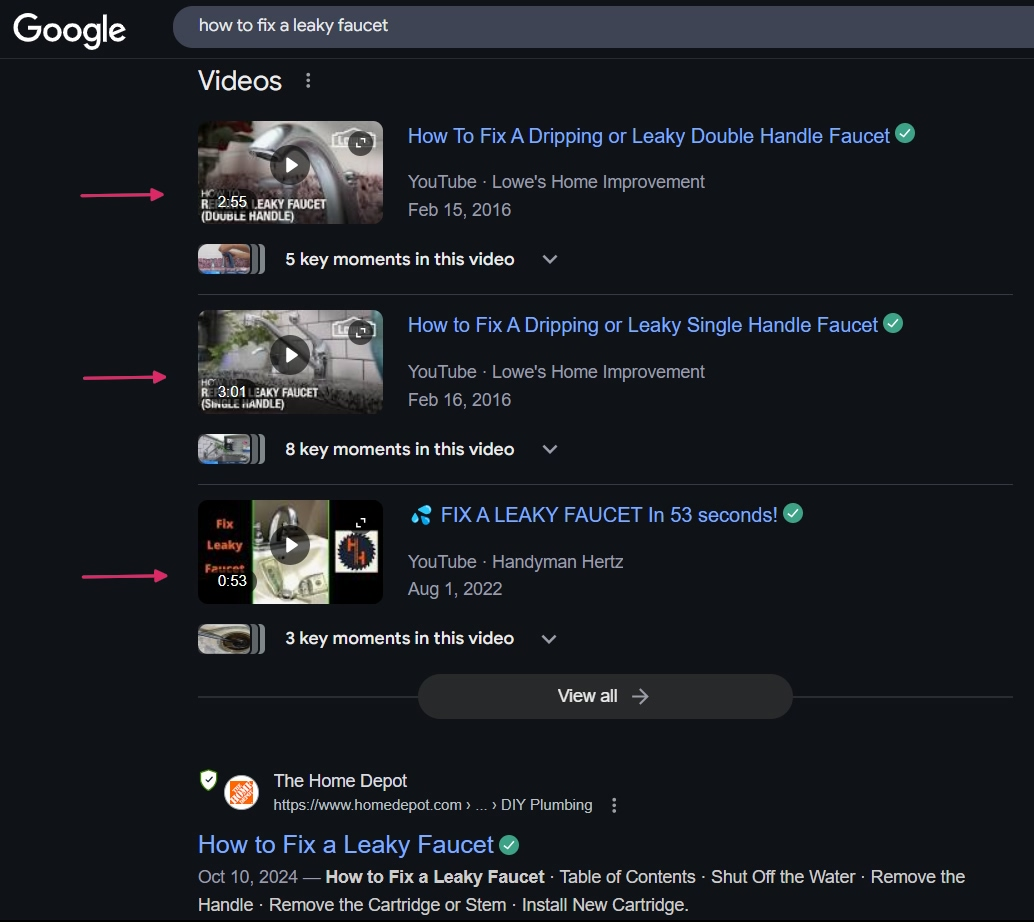

3. Repurpose Blog Content into Short-Form Videos
Turn your blog posts into bite-sized, engaging clips that work on social media.
- Use tools like Canva, CapCut, or InShot to edit simple, high-quality clips.
- Break down your main blog points into 15- to 60-second videos.
- Post them on TikTok, YouTube Shorts, and Instagram Reels.
For example: For a blog post about “5 Productivity Hacks for Remote Work,” you can:
- Create a 30-second video summarizing the hacks
- Overlay text with key points
- Use a trending sound or upbeat music
- Add a call-to-action: “Read the full guide in my bio”
Suddenly, your blog post reaches a wider audience beyond just Google searches.
4. Turn Blog Posts into Webinars or Live Q&As
Going live can increase trust, engagement, and authority in your niche.
- Host a 30-minute live session on YouTube or Instagram breaking down your latest blog post.
- Take audience questions and provide extra insights.
- Embed the recording into your blog post later for evergreen value.
📌 Pro Tip: Promote your live session in advance by emailing your subscribers or posting teasers on social media.
Don’t be afraid to experiment with different formats and styles until you find what works best for your brand and audience.
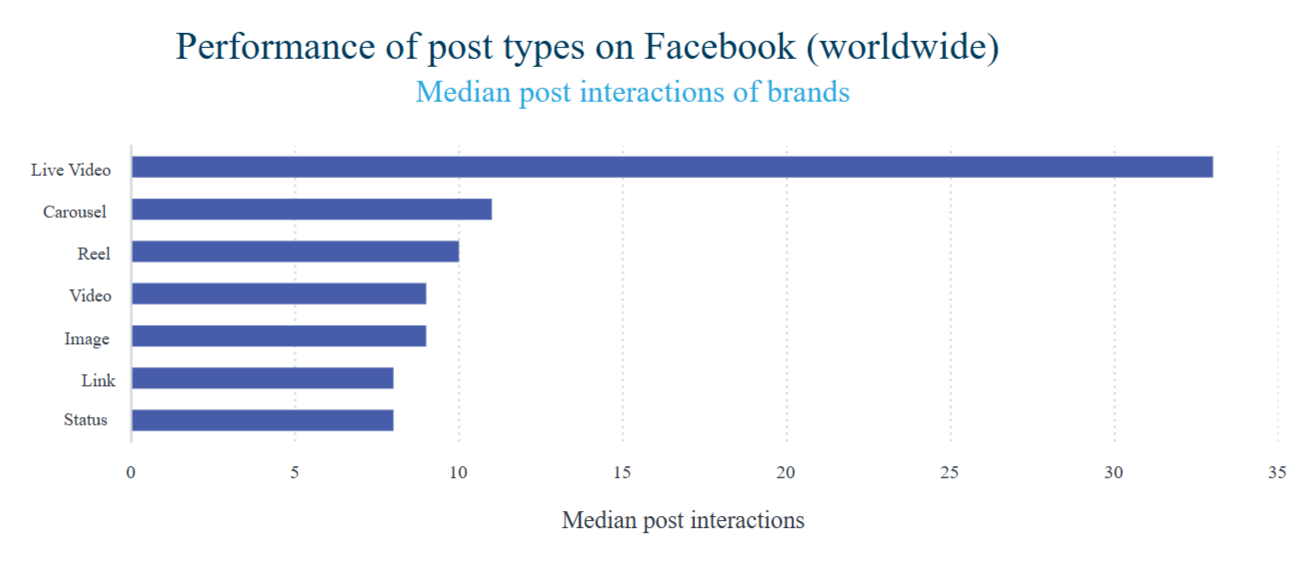

Live video gets 3x more interactions on Facebook compared to carousels.
2. Diversify Your Content Formats
Who wants to read a giant wall of text? Today’s internet users crave engaging, skimmable, and visually appealing content.
That means if your blog is still composed of heavy paragraph blocks, you’re losing readers, missing out on social shares, and falling behind.
The solution? Diversify your content formats.
By mixing things up — adding images, infographics, podcasts, and interactive elements — you can keep readers engaged, improve retention, and even boost your SEO rankings.
Here’s why this works:
✔️ Different People Prefer Different Content Formats
Not everyone consumes information the same way. Some people love reading. Others prefer watching. Some just want to listen to audio content on the go.
By offering multiple content formats, you:
- Reach a wider audience
- Improve user experience
- Increase engagement and retention
✔️ Google Loves Multimedia Content
Search engines are getting smarter. Google’s E-E-A-T principles (Experience, Expertise, Authoritativeness, and Trustworthiness) mean it prioritizes engaging, high-quality content.
Blogs with diverse content formats tend to:
- Rank higher because they improve time-on-page and dwell time
- Attract more backlinks (people love linking to unique, high-value resources)
- Perform better on social media, where visual content gets more shares
✔️ More Content Formats = More Monetization Opportunities
Text-based blogs can make money, but diversified content creates more revenue streams.
- Podcasts can be sponsored.
- Infographics can be licensed to other businesses.
- Video content can be monetized on YouTube.
By expanding beyond text, you open new doors for income while keeping your blog fresh and engaging.
How to Diversify Your Blog Content Without Hiring More People
You don’t need to become a graphic designer, podcaster, and video editor overnight. Just start small by gradually adding new formats to your blog.
1. Add High-Quality Images & Custom Graphics
A picture really is worth a thousand words. Instead of relying on boring stock photos, create custom visuals that enhance your blog content.
- Use Canva or Adobe Express to make unique blog graphics.
- Add screenshots and step-by-step visuals to tutorials.
- Use Memes & GIFs (where appropriate) to make your content more relatable.
📌 If you’re writing a post on “Best AI Writing Tools in 2025”, create a comparison chart showcasing the pros and cons of each tool.
2. Turn Key Blog Points into Infographics
Infographics are highly shareable, visually appealing, and great for summarizing complex topics.
- Use tools like Venngage or Visme to create easy-to-read infographics.
- Break down long-form content into simple, digestible visuals.
- Share them on Pinterest, Instagram, and LinkedIn for extra traffic.
📌 A step-by-step infographic on “How to Do Keyword Research in 2025” could go viral on social media while linking back to your full blog post.
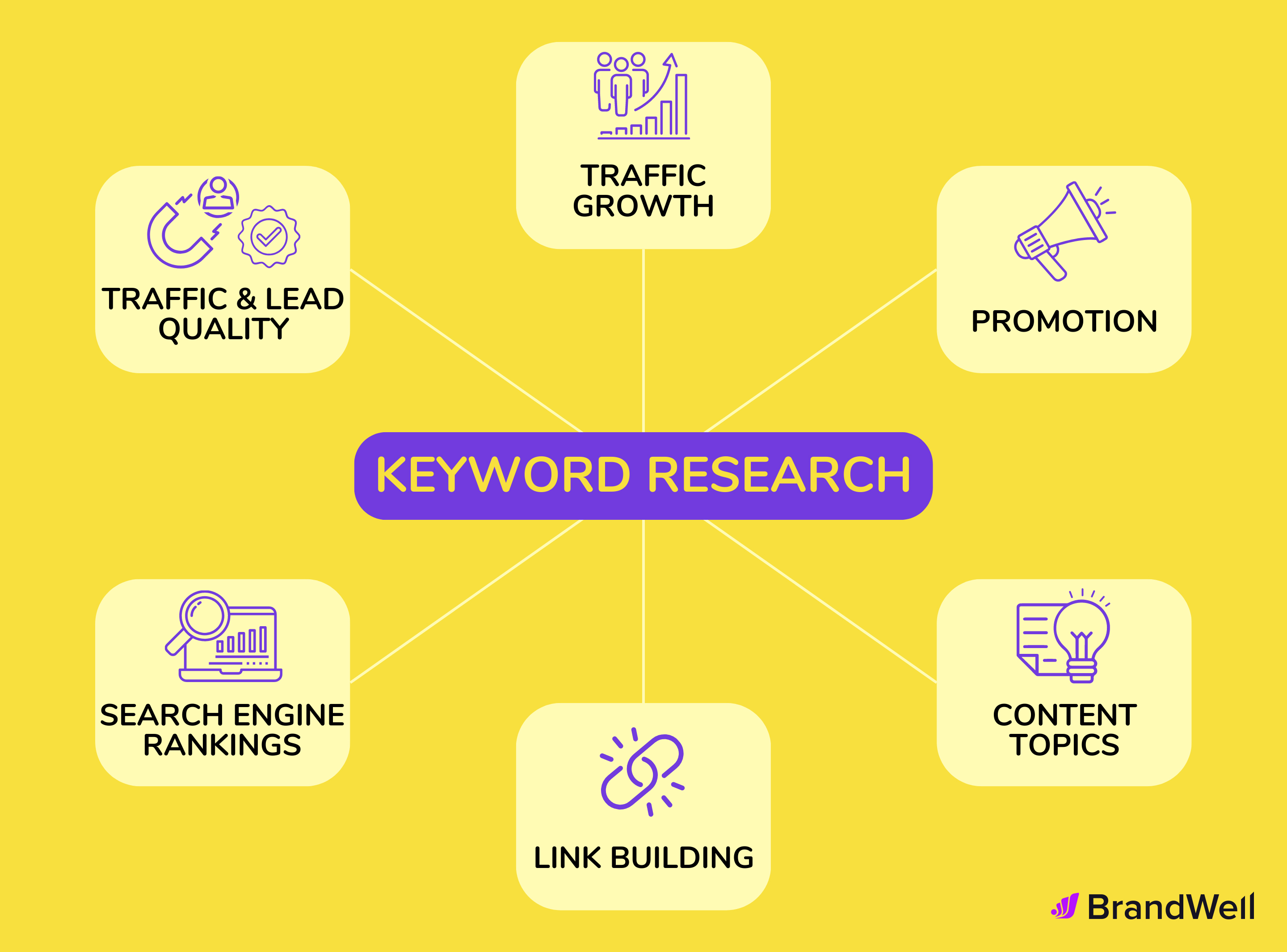

3. Offer an Audio Version of Your Blog (Mini Podcast)
Not everyone has time to read a 3,000-word article — but they might listen to it while commuting or working out.
- Record a 5-10 minute audio summary of your blog post.
- Upload it to Spotify, Apple Podcasts, or SoundCloud.
- Embed the audio player directly in your blog post.
📌 If you run a marketing blog, turn your posts into weekly mini-podcasts with quick industry updates and actionable tips.
Bonus: If your podcast gains traction, you can monetize it through sponsorships and listener donations.
4. Create Interactive Content (Polls, Quizzes, and Surveys)
People love engaging with content instead of just consuming it.
- Use polls to spark discussions and gather reader opinions.
- Create quizzes that offer personalized recommendations.
- Add surveys to understand your audience better and improve your content.
📌 If you run a personal finance blog, create a quiz like “What’s Your Investing Style?”. Visitors take the quiz, and at the end, they get tailored advice — with links to relevant blog posts.


5. Repurpose Blog Content for Social Media (Carousels & Threads)
Instead of just sharing links, repurpose your blog content into native social media posts.
- Twitter/X: Turn key takeaways into an engaging thread.
- Instagram & LinkedIn: Create a carousel post summarizing your blog post in slides.
- Pinterest: Convert blog sections into high-quality Pinterest pins.
📌 For a blog post on “The Future of Blogging”, you could turn it into:
- A Twitter Thread: Post 5 key blogging trends for 2025
- An Instagram Carousel: Design slides breaking down each trend
- A Pinterest Pin: Share a vertical graphic linking to your post
This way, you maximize your blog’s exposure without creating entirely new content.
You can also repurpose content the other way around. If you have a viral video or popular podcast episode, you can turn those pieces into long-form blog posts using BrandWell.
Here are six ways you can generate content with this app:
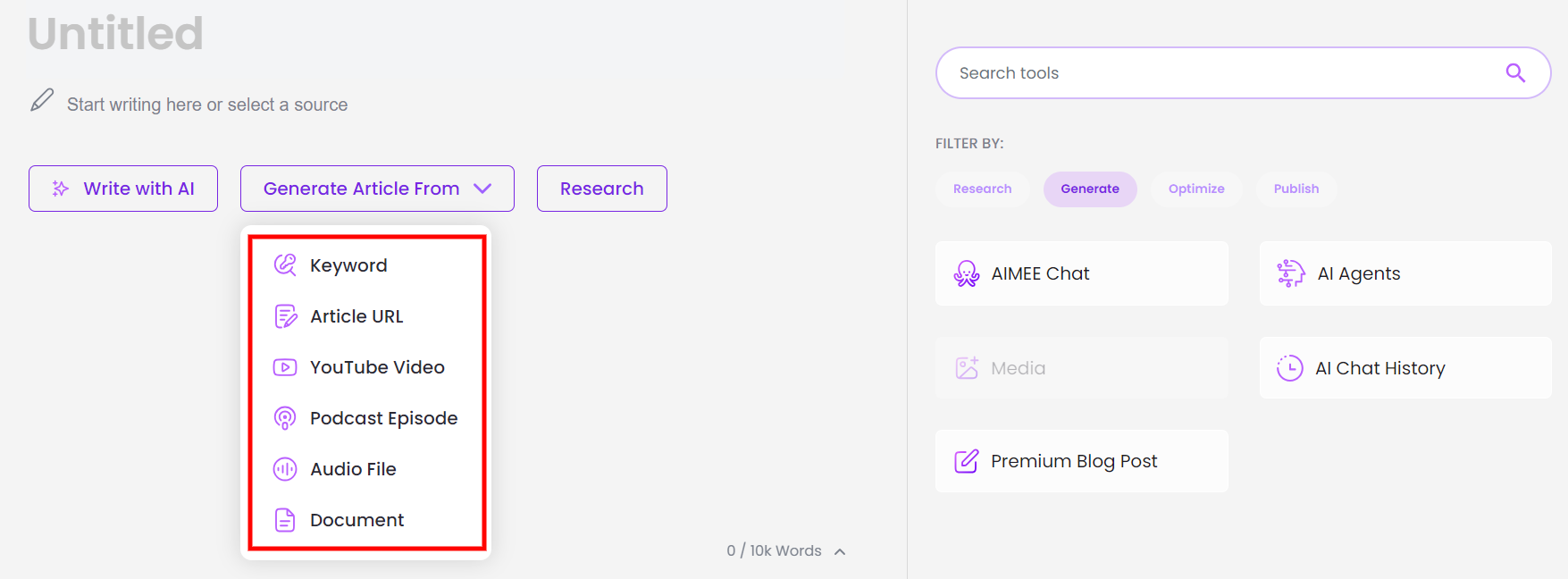

Just enter the URL of your content source and the AI will recreate it with a fresh take, plus updated insights from top-ranking content.
3. Optimize for Both Search Engines and User Experience
Creating great content is only half the battle. If your blog isn’t optimized for search engines and user experience (UX), it won’t rank well, and even if people do find it, they won’t stick around.
In 2025, SEO is no longer about keywords — Google is prioritizing helpful, engaging, and well-structured content.
At the same time, a seamless user experience keeps readers on your site longer, reduces bounce rates, and increases conversions.
Here’s how to optimize your blog for both search engines and real people (because ranking #1 means nothing if visitors bounce).
1. Focus on Long-Tail, Intent-Driven Keywords
Instead of broad search terms, target specific, intent-driven phrases.
Why?
✔️ Less competition = Easier to rank
✔️ More targeted traffic = Visitors who are ready to engage
✔️ Better for voice search & AI-driven queries
Types of intent-driven keywords:
- Informational: “How to get backlinks for free”
- Commercial: “Best AI writing tools for bloggers”
- Transactional: “Buy premium WordPress themes”
📌 Use tools like Google’s People Also Ask section and AnswerThePublic to find intent-driven keywords.
2. Nail Your On-Page SEO
Google’s algorithms are smarter than ever, meaning your content needs to be natural, relevant, and actually useful.
Remember: write for humans first, Google second.
- Be clear and concise — no fluff, no jargon.
- Use short paragraphs and bullet points for easy readability.
- Break up long sections with headings and visuals.
- Answer search intent quickly — don’t make readers hunt for information.
📌 If someone searches “How to monetize a blog in 2025,” don’t waste 500 words talking about the history of blogging. Get straight to the point.
3. Optimize for Voice Search by Answering Common Questions
Voice search is growing fast, with more people using smart assistants like Siri, Alexa, and Google Assistant.
How to optimize your blog for voice search:
- Use conversational, natural language.
- Answer questions directly in the first paragraph.
- Structure content in a Q&A format (e.g., FAQ sections).
- Use “featured snippet” style answers (short, clear responses).
For example: Instead of writing “SEO in 2025 requires a variety of new approaches to ranking well on search engines,” try this:
“What is SEO in 2025? SEO in 2025 focuses on user experience, AI-driven search, and voice search optimization. To rank higher, focus on long-tail keywords, site speed, and engaging content.”
📌 Google favors FAQ Schema Markup, so adding structured Q&A sections can increase your chances of appearing in voice search results.
4. Improve Your Blog’s User Experience (UX)
Google’s Core Web Vitals update means that user experience now directly impacts rankings. If your site loads slowly, is hard to navigate, or feels outdated, people will leave — and Google will notice.
Speed matters — a 1-second delay in page load time can lower conversions by 7%.
Here are some quick fixes for faster load times:
- Use a fast hosting provider (e.g., Cloudways, Kinsta, SiteGround).
- Compress images with tools like TinyPNG or ShortPixel.
- Minimize plugins if you’re using WordPress.
- Enable caching and use a Content Delivery Network (CDN).
📌 Test your site speed on Google PageSpeed Insights or GTmetrix and fix any red flags.
Over 60% of web traffic comes from mobile devices — if your blog isn’t mobile-friendly, you’re losing readers and rankings.
Make sure your blog:
- Uses a responsive design that adjusts to all screen sizes.
- Has readable fonts (no tiny text!).
- Avoids pop-ups that block content on mobile.
- Uses large, tappable buttons for easy navigation.
📌 Visit your blog on your phone. If you have to zoom in, pinch, or struggle to read anything — fix it ASAP.
5. Optimize Your Blog’s Structure for SEO & Readability
A well-structured blog post isn’t just good for readers — it also helps search engines understand your content and rank it higher.
Make sure your articles are written in the following structure:
H1 = Blog title (e.g., How to Get Quality Backlinks in 2025)
H2 = Major sections (e.g., What Are Backlinks?)
H3 = Subsections (e.g., Types of Backlinks)
H4 = Further breakdowns (if needed)
6. Add Internal & External Links (But Do It Smartly)
Linking to other relevant pages helps with both SEO and user experience.
Internal linking tips:
- Link to related blog posts to keep readers on your site longer.
- Use descriptive anchor text (not just “click here”).
External linking tips:
- Link to high-authority sources (Google prefers well-referenced content).
- Set links to open in a new tab so readers don’t leave your site.
By focusing on both SEO and UX, you’re making sure your blog is easy to find and enjoyable to read — which is exactly what Google (and your audience) wants in 2025.
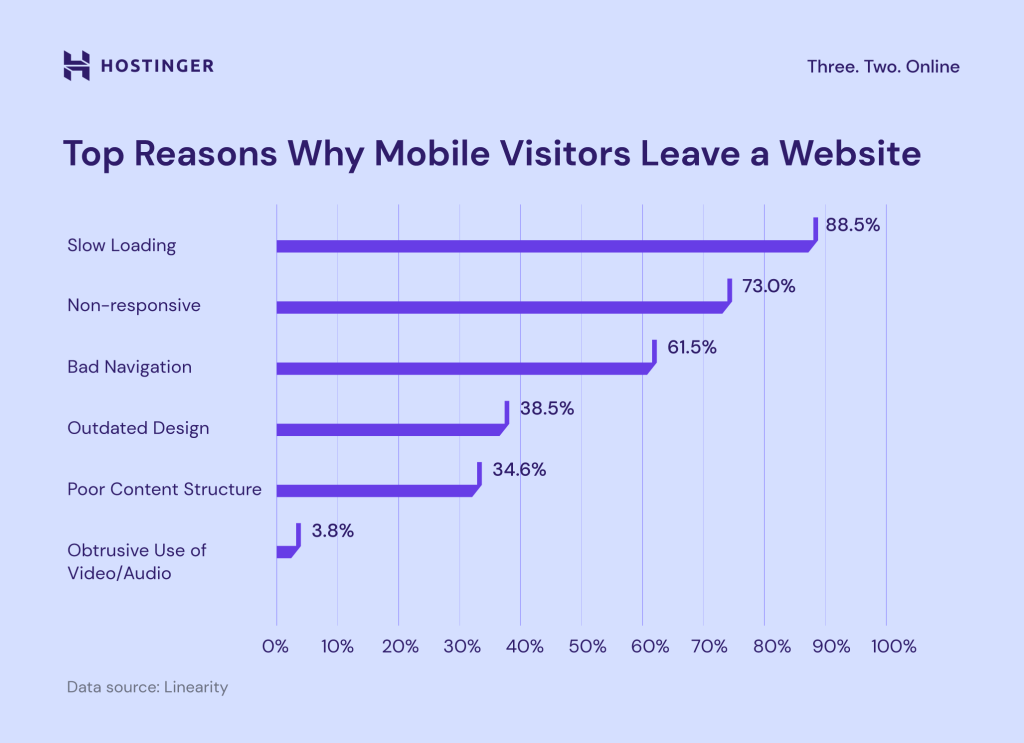

Image source: Hostinger
4. Promote Your Blog on Social Media Platforms
Social media can be a powerful tool for promoting your blog content and driving traffic to your website. But in 2025, it’s not enough to just share your blog post link on social media. Take the time to research where your ideal readers spend their time online, and then create a social media strategy that aligns with those platforms.
Here’s how to grow your blog on social media:
1. Choose the Right Social Platforms for Your Blog
Not every social media platform will work for every blog. Instead of spreading yourself too thin, focus on 2-3 platforms where your target audience hangs out.
- Twitter (X): Best for real-time updates, blog teasers, and engaging with industry influencers.
- LinkedIn: Perfect for professional and B2B blogs (SEO, marketing, business, SaaS).
- Facebook: Great for niche communities, sharing long-form posts, and building a loyal audience.
- Pinterest: A goldmine for evergreen blog traffic (especially for lifestyle, travel, food, and DIY blogs).
- Instagram & TikTok: Ideal for visual content, reels, and short-form videos (best for personal brands, fashion, fitness, and coaching).
Find out where your audience spends time and prioritize those platforms.
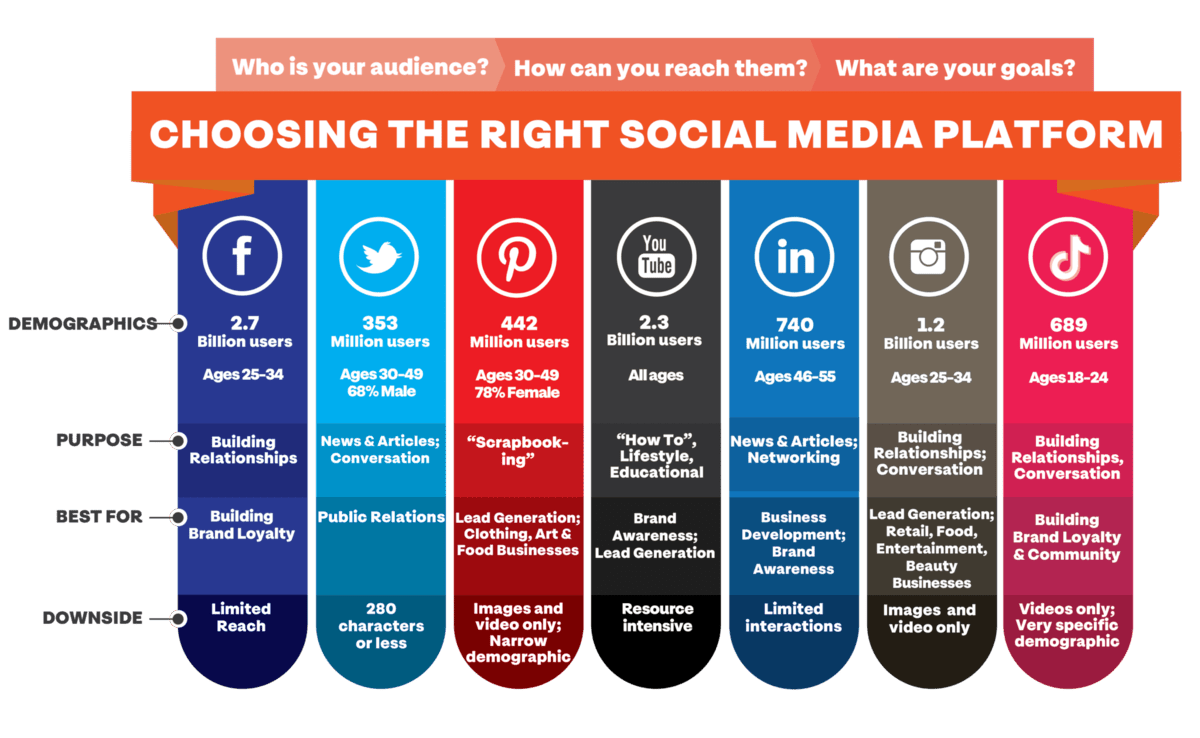

Image source: Sprinklr
2. Use Eye-Catching Visuals & Graphics
People scroll fast so your post needs to stop them in their tracks.
Cool graphics can make your post stand out on social media:
- Use high-quality images (preferably custom and original).
- Create custom graphics summarizing your blog’s key takeaways.
- Add text overlays to images so people immediately know the topic.
- Use GIFs and memes (where appropriate) to make your content fun.
📌Use Canva to design social graphics and CapCut for quick video edits.
3. Engage with Your Audience & Encourage Shares
Social media is not just about posting — it’s about starting conversations.
How to engage effectively:
- Ask a thought-provoking question related to your blog topic.
- Tag relevant influencers or brands (they might share your post!).
- Respond to comments and DMs—this boosts your reach.
- Encourage user-generated content (ask followers to share their own experiences).
- Join discussions in Facebook groups, Twitter threads, and LinkedIn posts.
📌 Schedule time daily to reply to comments and engage with others in your niche.
4. Leverage Short-Form & Viral Content Trends
Short-form content (Reels, TikToks, Shorts, Threads) is dominating social media.
Use this trend to drive blog traffic:
- Summarize one key takeaway from your blog in a 30-second video.
- Use trending sounds and hashtags to boost visibility.
- Add text overlays so people can read without sound.
- Use hooks to grab attention fast (e.g., “Nobody is talking about THIS SEO trick…”).
📌 Film a 30-second video summarizing your latest blog post and post it on TikTok, Reels, and YouTube Shorts.
5. Automate & Schedule Your Social Media Promotion
If you’re busy blogging, you don’t have time to manually post every day. That’s where scheduling tools come in.
Best tools to automate social media promotion:
- Buffer – Schedule and auto-post content.
- Hootsuite – Manage multiple social accounts in one place.
- Publer – Supports multiple formats, including reels & videos.
- MissingLettr – Creates automated content campaigns from blog posts.
📌 Plan a week’s worth of social media posts and schedule them using Buffer or Publer.


Image source: Hootsuite
6. Collaborate with Influencers & Cross-Promote with Other Bloggers
Want free exposure? Partner with influencers and bloggers in your niche.
- Mention & tag influencers in your blog (they might share it!).
- Offer guest posts or cross-promote each other’s content.
- Do Instagram/TikTok collabs where you both share a tip.
- Join Twitter Spaces, LinkedIn live chats, or podcast interviews.
📌 Find 3 influencers in your niche and engage with their content before pitching a collaboration.
With the right strategy, social media can become a powerful traffic source for your blog in 2025!
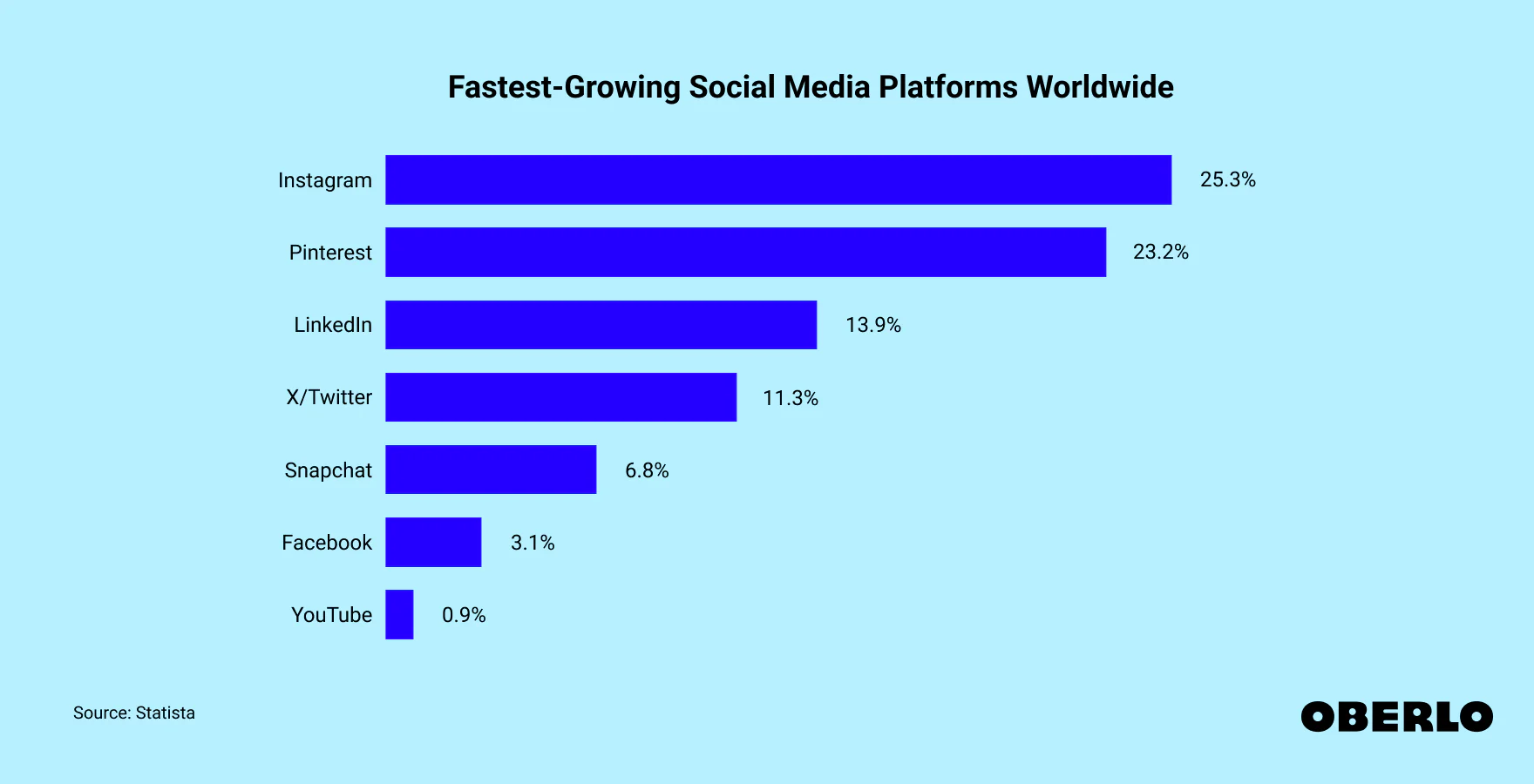

Image source: Smart Insights
Finding Your Niche in the Crowded Blogging Space
With over 600 million blogs on the internet today, it can be tough to stand out in such a crowded space. But by finding your niche and creating content that truly resonates with your target audience, you can build a loyal following and establish yourself as an authority in your industry.
Identify Your Target Audience and Their Needs
The first step in finding your niche is identifying your target audience and understanding their needs, challenges, and pain points.
Rather than writing for everyone, focus on a specific audience with a clear problem.
Ask yourself:
- Who am I writing for?
- What challenges do they face?
- How can I provide solutions better than anyone else?
Take the time to research your ideal reader and create detailed buyer personas that outline their demographics, interests, and behaviors.
Once you have a clear picture of who you’re writing for, you can create content that speaks directly to their needs and provides real value.
Create Unique and Valuable Content
In a sea of generic blog posts and rehashed ideas, creating unique and valuable content is key to standing out in your niche.
Make your blog stand out by:
- Sharing personal experiences instead of regurgitated information.
- Offering a unique perspective on trending topics.
- Providing actionable insights that readers can implement immediately.
- Showcase testimonials, case studies, and real-world results.
- Publish well-researched, data-backed content to enhance credibility.
Don’t be afraid to share your own opinions, experiences, and insights, even if they go against the grain.
Focus on creating content that solves real problems, answers burning questions, and provides actionable advice that your readers can implement right away.
Build a Strong Brand Identity
A blog is more than just content — it’s your brand. Develop a recognizable voice, style, and aesthetic that sets you apart.
This includes:
- A consistent visual identity (logos, colors, typography).
- A unique writing tone that resonates with your audience.
- A strong value proposition that defines what makes your blog different.
Your unique personality, values, and mission, and should be consistent across all of your marketing channels.
Take the time to develop a clear brand voice and visual identity, and make sure every piece of content you create aligns with your overall brand message. By staying true to your brand and delivering on your promises, you can build a loyal following of readers who trust and value your expertise.
Monetizing Your Blog in 2025 and Beyond
Blog monetization has changed over the years, but in 2025, there are more opportunities than ever to turn your blog into a solid income stream.
It’s not just about slapping some ads on your site and calling it a day anymore. If you want to turn your blog into a sustainable income stream, you need to get creative and think beyond the traditional methods.
Whether you want to make passive income or turn blogging into a full-time business, here are the best ways to monetize your blog in 2025 and beyond.
1. Affiliate Marketing: Earn Commissions for Every Sale
Affiliate marketing is still one of the best ways to make passive income from a blog. You promote products or services using special affiliate links, and when someone makes a purchase, you earn a commission.
✔ Focus on high-ticket affiliate programs (like software and online courses) to maximize earnings.
✔ Create detailed product reviews, comparison posts, and tutorials to boost conversions.
✔ Use AI tools like Lasso or ThirstyAffiliates to manage and optimize your links.
📌 If you run a tech blog, you could review laptops, gaming gear, or AI tools and include affiliate links from Amazon, Best Buy, or software companies BrandWell and Grammarly. Writing in-depth comparisons like “Best AI Writing Tools: BrandWell vs. ChatGPT“ can help attract readers who are ready to buy.
2. Display Ads: Get Paid for Traffic
Ads are one of the easiest ways to monetize a blog with high traffic. Platforms like Google AdSense, Mediavine, and AdThrive pay you for displaying ads on your site.
✔ If you’re just starting, Google AdSense is easy to get approved for, but the earnings are low.
✔ Once you reach 50,000 sessions/month, apply for Mediavine (higher earnings).
✔ For premium ad rates, AdThrive requires 100,000+ pageviews per month.
📌 If you run a recipe blog, ads can be a huge revenue source since readers spend time scrolling through your content.
3. Sell Digital Products (eBooks, Templates, and Courses)
Why send traffic to other people’s products when you can sell your own? Digital products require a one-time effort but can generate passive income for years.
✔ Create ebooks, templates, or mini-courses related to your niche.
✔ Use platforms like Gumroad, Podia, or Teachable to sell them.
✔ Offer limited-time discounts and bundle deals to boost sales.
📌 If your blog is about personal finance, you could sell an “Investing for Beginners” ebook or a budgeting spreadsheet template.
4. Offer Freelance Services or Consulting
If your blog establishes your expertise, why not turn that into a high-paying service? Many bloggers make more money from services than from their actual blogs.
✔ Offer freelance writing, SEO consulting, coaching, or web design services.
✔ Use your blog to showcase your knowledge and portfolio.
✔ Add a “Hire Me” or “Work With Me” page on your website to attract clients.
📌 If you run a health and wellness blog, you could offer personalized nutrition plans, fitness coaching, or mindfulness consulting. For instance, if your blog focuses on plant-based diets, you could provide custom meal plans and one-on-one coaching sessions for people transitioning to veganism. Use your blog to showcase success stories, case studies, and testimonials to attract more clients.
5. Sponsored Content & Brand Deals
Brands are always looking for influencers and bloggers to promote their products. Sponsored blog posts, product reviews, and collaborations can bring in serious money.
The key is to only work with brands that align with your values and are relevant to your audience. Don’t just promote anything for a quick buck — your readers will see right through that, and it will erode the trust you’ve worked so hard to build.
✔ Reach out to brands in your niche and pitch sponsored content.
✔ Set your rates based on traffic, engagement, and influence.
✔ Use platforms like Influence.co or Intellifluence to connect with brands.
📌 A travel blogger could partner with hotels, luggage brands, or tour companies for sponsored posts and paid reviews.
6. Memberships & Exclusive Content
If you have a loyal audience, offer premium content behind a paywall. Memberships provide recurring income while keeping your best content exclusive.
✔ Use platforms like Patreon, Buy Me a Coffee, or Substack to monetize subscribers.
✔ Offer exclusive blog posts, behind-the-scenes content, or private Q&A sessions.
✔ Combine memberships with a private community or Discord server for extra value.
📌 A blogger who covers stock market trends could offer weekly premium analysis for paying subscribers.
7. Sell Merch & Print-on-Demand Products
If you’ve built a strong brand, you can sell custom merch like t-shirts, mugs, notebooks, or stickers. Print-on-demand services let you sell without handling inventory.
✔ Use Printful, Teespring, or Redbubble to create and sell custom designs.
✔ Promote your merch in your blog posts and social media.
✔ Focus on niche-specific designs to attract buyers.
📌 A fitness blogger could sell motivational gym t-shirts with catchy slogans.


Image source: Scale Up Collective
8. Turn Your Blog into a Paid Newsletter
Instead of relying on ads and social media, turn your email list into a direct income source. Paid newsletters are growing fast, and readers are willing to pay for high-quality insights.
✔ Use Substack, ConvertKit, or Ghost to launch a paid newsletter.
✔ Offer exclusive deep dives, industry trends, or expert tips.
✔ Start with a free version to build trust, then upsell a paid subscription.
📌 Example: A tech blogger could run a “Weekly AI & Tech Insights” paid newsletter for professionals.
Blog monetization isn’t a one-size-fits-all strategy — the best ones depend on your niche, traffic, and audience.
Your action plan:
✅ Start with affiliate marketing & digital products to create passive income.
✅ If you have high traffic, add display ads & sponsorships.
✅ If you’re an expert, offer consulting or memberships.
✅ Experiment with paid newsletters, merch, and courses.
By diversifying your income streams, you can future-proof your blog and turn it into a profitable business in 2025 and beyond!
The Future of Blogging: Trends and Predictions
So, is there a future for blogging?
While it’s impossible to predict exactly what the blogging landscape will look like in the coming years, there are a few trends and predictions we can make based on what we’re seeing now.
Video and Interactive Content
One trend that’s been on the rise in recent years is the use of video and interactive content in blogging. From embedded videos and live streams to quizzes and polls, bloggers are finding new ways to engage their audiences and make their content more dynamic.
I predict that this trend will only continue to grow in the coming years, as more bloggers experiment with different formats and technologies. The key will be to find ways to incorporate video and interactivity that complement your written content and provide value to your audience.
Virtual and Augmented Reality
Another trend to watch is the potential impact of virtual and augmented reality on blogging. While these technologies are still in their early stages, they have the potential to revolutionize the way we create and consume content.
Imagine being able to take your readers on a virtual tour of a destination you’re writing about or allowing them to interact with your products in a virtual showroom. The possibilities are endless, and I’m excited to see how bloggers will leverage these technologies in the future.
Personalization and Micro-Niche Blogging
Finally, I believe that personalization and micro-niche blogging will play an increasingly important role in the future of blogging. With so much content out there, readers are looking for blogs that speak directly to their specific interests and needs.
By niching down and creating content that’s tailored to a specific audience, bloggers can build deeper connections with their readers and establish themselves as go-to resources in their fields. This could involve anything from creating content in multiple languages to focusing on a specific geographic location or demographic.
The key will be to find the right balance between niche and broad appeal and to always prioritize the needs and interests of your audience over chasing trends or trying to be everything to everyone.
FAQs: Is There a Future for Blogging?
Is there a future for blogging?
Yes, blogging still has a strong future, but it’s evolving. In 2025 and beyond, successful blogs will focus on high-quality, engaging, and multimedia-rich content rather than just plain text. Bloggers who integrate video, interactive elements, and social media promotion will continue to thrive. As long as people search for information online, blogging will remain a valuable tool for businesses, creators, and marketers.
Is blogging still worth it in 2025?
Absolutely! Blogging is still one of the best ways to build authority, drive organic traffic, and generate income through affiliate marketing, ads, and digital products. However, bloggers need to adapt by optimizing for SEO and user experience and diversifying content formats like video and audio. With the rise of AI-generated content, authentic, expert-driven blogs will stand out and remain highly valuable.
What is replacing blogging?
Nothing is fully replacing blogging, but new content formats like YouTube videos, short-form videos (TikTok, Instagram Reels), and AI-generated content are competing for attention. However, blogs still play a crucial role in search engine visibility, in-depth content, and long-term organic traffic. Instead of replacing blogging, successful creators are integrating multiple content formats to reach a wider audience.
Can blogging be replaced by AI?
Nope. AI can help with content creation, but it won’t fully replace blogging. While AI tools can generate articles quickly, they lack personal insights, human creativity, and genuine expertise — factors that make blogs valuable.
In 2025 and beyond, blogs written by real experts, with unique perspectives and engaging storytelling, will continue to outperform AI-generated content in terms of authority and trustworthiness.
Conclusion
So, is there a future for blogging? Absolutely. But it’s not the same blogging landscape we knew a decade ago. It’s a brave new world of video content, AI-assisted writing, and niche-driven strategies.
The key is to stay agile, stay authentic, and stay committed to creating content that truly resonates with your audience. From thoughtful long reads and lively tweets to dynamic videos, every bit of content should serve up value and spark sincere relationships.
If you want to stay ahead of the curve and scale your content strategy efficiently, check out BrandWell — a complete AI-powered content marketing platform designed to help bloggers produce high-quality, long-form content that ranks. Whether you’re a solo blogger or a content team, BrandWell can streamline your publishing workflow while keeping your audience engaged.
The future of blogging is bright for those willing to adapt and innovate. So don’t get left behind. Dive into change, sharpen those skills, and let your distinct voice stand out. Your audience is waiting.

UNLOCK YOUR POTENTIAL
Long Headline that highlights Value Proposition of Lead Magnet
Grab a front row seat to our video masterclasses, interviews, case studies, tutorials, and guides.

